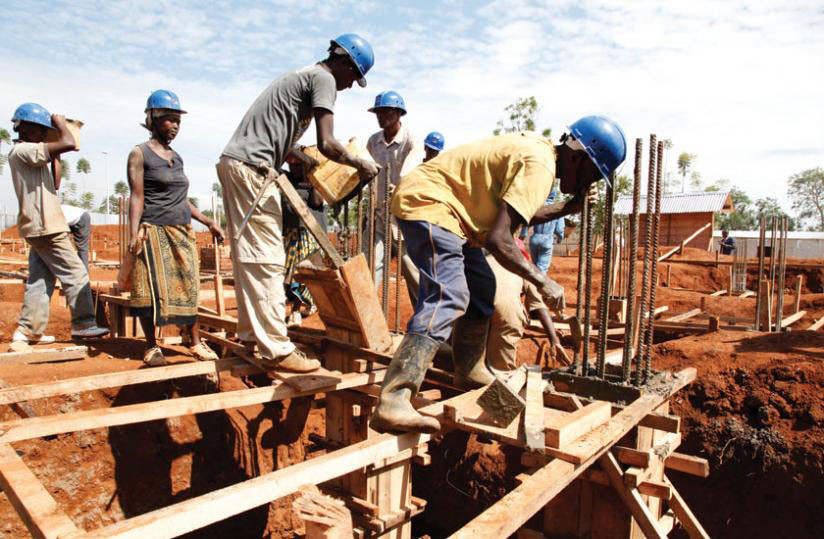Urban areas represent an estimated 70 per cent of energy-related global emissions, according to United Nations Environment Programme (UNEP). UNEP says buildings and the construction sector alone account for over 20 per cent of global greenhouse gas emissions.


Urban areas represent an estimated 70 per cent of energy-related global emissions, according to United Nations Environment Programme (UNEP).
UNEP says buildings and the construction sector alone account for over 20 per cent of global greenhouse gas emissions. Achieving the sector’s potential 80 per cent reduction in carbon emissions by 2050 (as forecasted by the International Energy Agency) will be critical to the success of the Paris Agreement.
It is against this background that experts are calling on city/urban authorities and governments to put priority in implementing their climate commitments by acting locally and partnering globally to reduce carbon emissions and mitigate climate change.
By acting now in adaptation on extreme climate by sub-national governments, cities, towns and regions will make big impacts to mitigate climate change, experts say.
Gino Van Begin, the secretary-general of Local Governments for Sustainability (ICLEI), while addressing the Global Climate Action day on Cities and Human Settlements at the UN Climate Change Conference (COP22) in Marrakech, Morocco, on Thursday, said governments need to show commitment to bridge emissions in cities.
ICLEI is the global network of over 1,500 cities, towns and regions committed to building a sustainable future. Rwanda is an affiliate to this organisation through Rwandese Association of Local Government Authorities (RALGA).
"Nations gathered at COP22 now need to show leadership by providing a strong framework to support action and a powerful roadmap to scale up climate action and bridge the emissions gap before it is too late. Climate action in and by cities, towns and regions will be instrumental in ensuring that we stay on a 2°C pathway, aiming for 1.5°C,” he said.
COP 22 has been dubbed the "implementation COP” and cities and human settlements have been urged to showcase the potential of local action for implementation, focused on resilience and building efficiency.
Climate change meet
In Morocco, environmentalist argue that, the Global Covenant of Mayors for Climate and Energy, should continue building on work done by the Compact of Mayors and European Union Covenant of Mayors, to enable a "powerful platform” for local governments worldwide to monitor and report their own climate commitments.
The World Bank says that, adapting to changing climate could cost between USD 80-100 billion every year, 80 per cent of which will need to be invested in urban areas.
Developed nations are expected to pledge USD 100 billion per financial year by 2020 to support action in the poorest and most vulnerable countries. This is considered as a critical factor in driving the climate adaptation agenda forward.
In Marrakech, a special dialogue on Financing Urban Resilience, by Cities Climate Finance Leadership Alliance (CCFLA) and partners, was held to address the issue of how to secure funds for resilience projects with a longer-term investment horizon.
Some of the proposed pathways for cities to mitigate climate change include, preservation of historic and natural assets, boosting clean energy, and upgrading power infrastructure.
******
RWANDA ON THE MOVE?
Recognising that cities are both drivers of energy consumption and central to the country’s development, the Government of Rwanda has made a commitment to transform cities into inclusive, and sustainable green growth-oriented infrastructure.
While addressing the Energy Day meeting at COP22, on Friday, Faustin Munyazikwiye, the director of Climate Change and International Obligations Department at Rwanda Environment Management Authority (REMA), said, globally, air conditioners are the largest contributor to peak load electricity use from household appliances, and can account for 40–60 per cent of peak summer energy load in cities with hot climates.
"Improving energy efficiency is a win-win opportunity: it reduces emissions, it saves money, it improves energy security and air quality, and it provides enormous public health benefits.” Munyazikwiye said.
In its target on green urbanisation, the second Economic Development and Poverty Reduction Strategy aims to enhance the quality of life for all Rwandans through sustained growth of 11.5 per cent, and drive urban green growth and development with green economic opportunities.
In this regard, EDPRS II intends to guide Rwanda toward having "cities as poles of job-creation, green infrastructure and investments, anchored on low carbon and climate resilient urban planning.”
editorial@newtimes.co.rw


